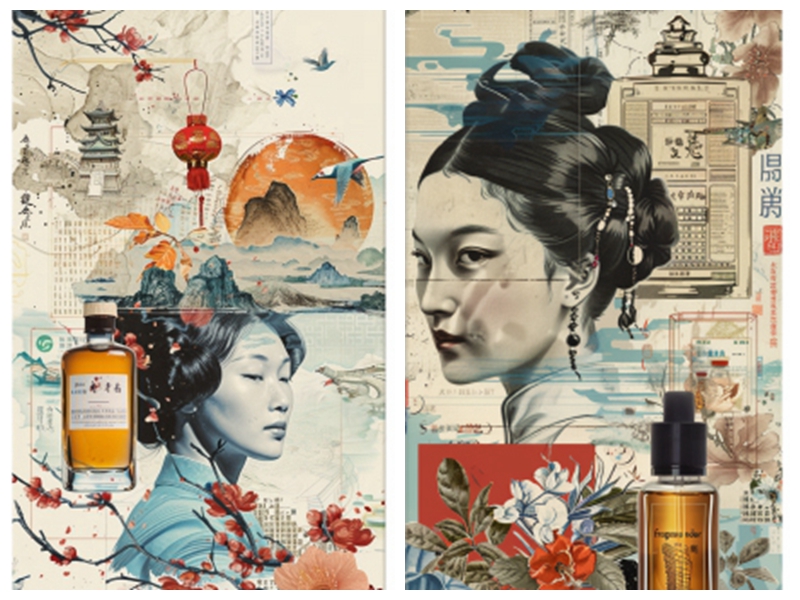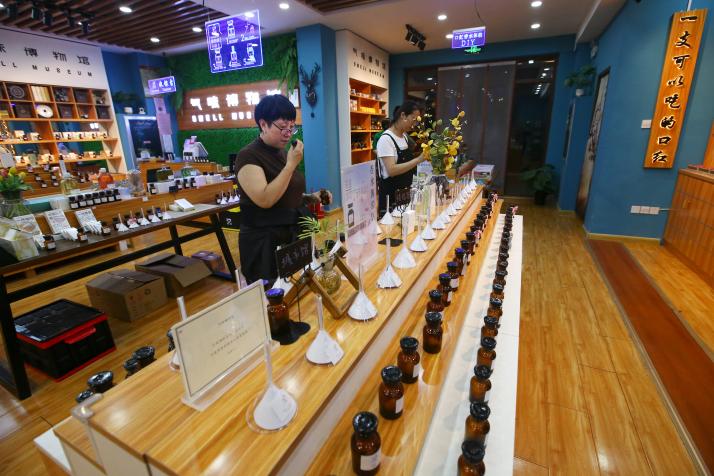| Lifestyle |
| A new scent-scape | |
|
|
 From whiffs of ancient incense battles to contemporary notes of DIY fragrance formulas... Adorning oneself with perfume has become a rite of passage in contemporary China, a testament to an ever-evolving society (AI)
Setting the scene. The year was 2014; summer was sweltering and this author found herself waiting for the elevator inside a high-rise residential compound, ready for a night on the town. Freshly showered, slathered in a neutral-smelling body lotion and adorned with a few spritzes of body fragrance mist, the notes drifted up to the Western nose like a pleasantly tickling symphony… Yet it seemed Chinese nostrils were flared. Upon stepping into the elevator, she overheard two young Chinese women standing behind her say: "Tai xiang la (Too strong)." Fast forward one decade, and we once again find ourselves inside an elevator. But this time around, a similar, equally light, body lotion and fragrance combo evoked a rather different reaction: "Hao xiang a (That smells nice)." A mere 10 years ago, being scented earned yours truly a Pepe Le Pew comparison. Today, it appears to be the height of funky fashionable appeal. So, putting on perfume... A society's rite of passage? Whiffs of history Long before French monarch Louis XV ushered in la cour parfumée ("the perfumed court" in French) in the 18th century, China had already formed elaborate etiquettes and entertainment based on xiang (which can translate as "incense," "fragrance," "herbs" or "spices") starting in the Han Dynasty (206 B.C.-A.D. 220). In ancient China, scent and perfume held cultural and ritualistic importance, and the Silk Road trade routes played a big part in ancient China's scent-scape by expediting the exchange of aromatic materials and spices across vast distances. Fragrant oils, flowers and sandalwood, among other sources of scent brought in via the routes, would fill the air inside the imperial court. Han-era ministers, for example, were required to aromatize their robes with incense made from cinnamon, clove, cassia and star anise before meeting with the emperor. Women would douse themselves in nectars extracted from lily, lotus and chrysanthemum, as often depicted in classic Chinese literature and art. Cool kids hamming it up in the Tang (618-907) and Song (960-1279) dynasties would even engage in full-fledged douxiang (incense battles) as they delighted in incense making, spice identification, and poetry or art creation based on their aromatic proficiencies. Throughout the early 20th century, and especially in bustling hubs like 1930s Shanghai, international perfume brands alongside local manufacturers contributed to the diversification and growth of the perfume market. But during the tumultuous period that was the "cultural revolution" (1966-76), for example, the government promoted a rejection of bourgeois and capitalist influences, including Western fashion and luxury goods like perfume. Whatever perfume industry that had existed before evaporated into thin air. Then, in 1978, the country decided to open up and reform its economy. Today, more than four decades on, China's fragrance market has moved from ancient myrrh to a myriad of scents spicing things up. Sniffing an opportunity China's rapid economic development since the late 20th century has led to an increase in the number of middle-income earners. Consumer preferences have shifted toward personal grooming and luxury items as symbols of status and self-expression. Perfumes included. A 2022 market report titled How Niche Fragrances Are Winning Over Young Chinese Consumers, published by Jing Daily, the leading digital publication on the global business of luxury in China, noted that in 2017, only 2.5 percent of China's massive population of over 1.4 billion used personal fragrances, compared to nearly 52 percent of Americans. But the number in China has doubled in recent years, reaching 5 percent. "Although the percentage is still low compared to Western counterparts, its rapid expansion indicates a booming opportunity for brands to dig into. China's personal fragrance market has shown remarkable resilience. It nearly doubled in size from 2017 to 2020 and is projected to reach a staggering $4.73 billion by 2025," Lisa Nan, beauty editor at Jing Daily, told Beijing Review while elaborating on the statistics. One reason behind this growth, according to Nan, is "education." With international brands having entered China and marketed themselves since the late 1990s, they have exposed consumers to Western aesthetics and habits, bringing in new perspectives on skincare and fragrance usage. "The effect of education is particularly evident now as the overall life quality of the population improves and skincare and perfumes are becoming very much affordable for people," Nan continued. However, once the top notes in China's burgeoning scent sector, established international brands—from Chanel to Dior to Le Labo to you name it—now find their edge fading as the rise of homegrown labels is altering the scent-scape. A major factor here has been the intensification of guochao (literally "national wave" but meaning "hip heritage" or "China Chic"), the No.1 fashion trend since 2018. At its core, guochao is about the growing inclination of young Chinese consumers toward domestic brands and products, especially those labels integrating traditional Chinese cultural elements and styles. Over the past five or so years, this desire for local storytelling has also created a new scent profile.  A customer shops for perfume at a cosmetics store in Qingdao, Shandong Province, in May 2023 (CNSPHOTO)
Sweet smell of success? "Recently, I wrote an article about Marc Jacobs fragrance, a once top 10 global perfume brand, shrinking in China. Chinese shoppers are extremely sophisticated. They might have just started to wear fragrances, but the proliferation of related information online spread by beauty bloggers and experts has led to a highly conscious consumer who knows exactly what they want and wish to distinguish themselves by wearing lesser-known perfumes," Nan explained. Different scents can evoke specific emotions, memories and moods. And so the market sees a new trend sweeping young consumers toward crafting their own unique scent-scapes rather than relying on big luxury names. This shift has propelled niche domestic brands like Documents and To Summer, renowned for infusing oriental ingredients and aesthetics into their collections, to new heights. To Summer's flagship store on Beijing's Guozijian Street sits inside a 500-square-meter renovated siheyuan, or traditional Chinese courtyard, built in the mid-Qing dynasty (1644-1911). The white space with exposed wooden roof trusses and columns oozes a sense of calm and cool. On a quest for more intel, a salesperson told this author that two top sellers are the "light and uplifting," Rambler Rose and Osmanthus products. Evolving from ancient incense battles, the contemporary scent scene is ablaze with creativity, with young Chinese rejoicing in perfume workshops and surrounding themselves with a sense of self-discovery. On Douyin, the Chinese version of TikTok, the hashtag "DIY perfume" had racked up 130 million views as of June 25. Xie Dongfang, founder of the Shanghai-based ECOLIT brand, detects the aromas of this fresh journey in his brand's store every day. By studying the characteristics of Zodiac signs, their perfume preferences and the sensory effects of different plant smells on humans, ECOLIT has designed two major series of aromatherapy products: one based on Western Zodiac signs and another on those of the Chinese Zodiac. "People of different signs form an emotional connection with aromatherapy products. But our aromatherapy candles also add some practical benefits," the ECOLIT founder stated. "Customers are embracing the brand's plant-derived, skin-friendly essential oils and refined plant-based ingredients, even integrating them into their skincare routines as balms or essential oils—and delighting in the results," he expounded. As is the case in China's aroma-related sector at large, the majority of the brand's customers are young women. So, on a gender-related note… Let's hear it for the boys? Young bucks vs. big bucks In Western markets, young male consumers, fueled by TikTok trends like smelllmaxxing, i.e., teen boys obsessed with spritzing on designer musk rather than your standard AXE body spray, are spending more and more on brands like Tom Ford, Kilian or JP Gaultier to enhance personal appeal and signal maturity. But even though more and more Chinese men are embracing fragrances, these budding aficionados are sniffing around for value. "With a plethora of lab-less [often marketed as being developed through natural or alternative processes] fragrances flooding Douyin and other social media platforms, price sensitivity is key," Nan said. Many of China's male consumers consider wearing a signature bouquet hot yet uncharted territory. Most Chinese gents only dip their toes in the perfume pool once they've hit full stride as adults. Without much childhood or teenage exposure, they're still playing catch-up with their Western counterparts in terms of fragrance finesse. Neutral woody scents appear to be the primary showstoppers du jour, beloved for their charm-boosting powers. On Douyin, the related hashtag had gathered 90,000 views as of June 25. From whiffs of ancient wisdom to niche brands springing up like mushrooms... Adorning oneself with perfume has become a rite of passage in contemporary China, a testament to an ever-evolving society. Smelling is believing. Copyedited by G.P. Wilson Comments to elsbeth@cicgamericas.com |
|
||||||||||||||||||||||||||||||
|